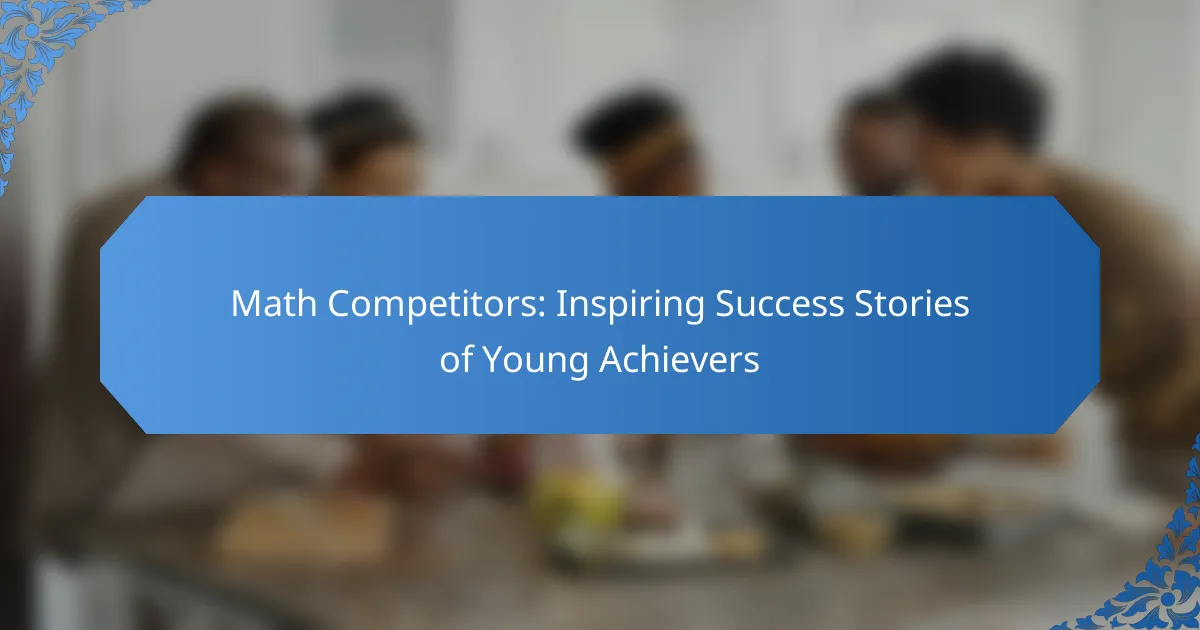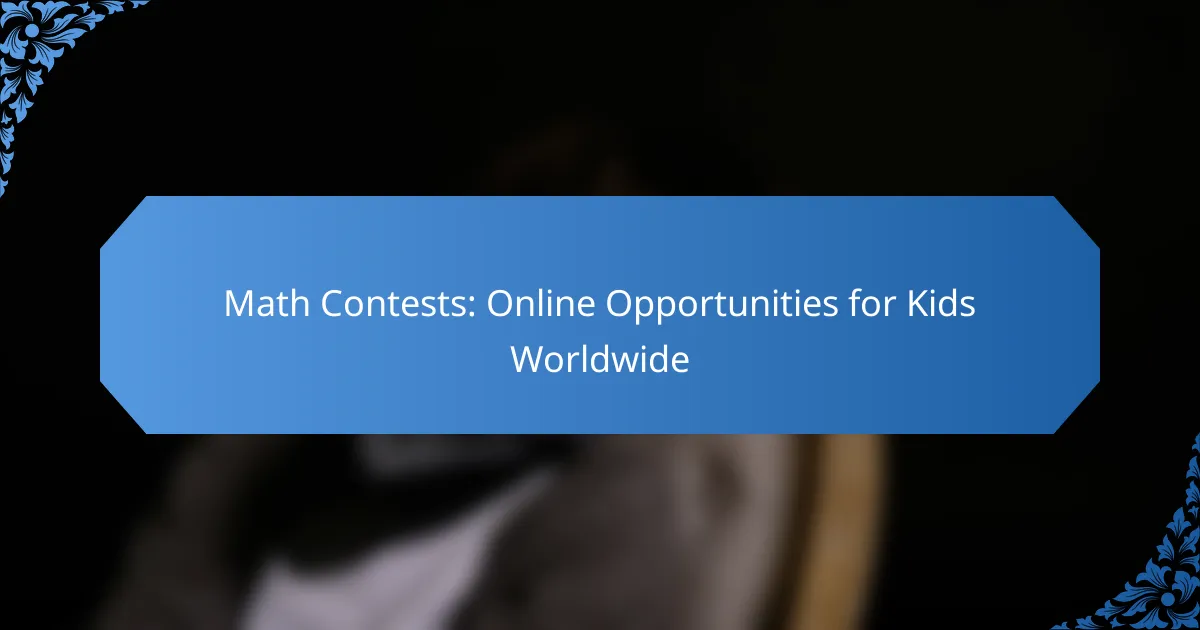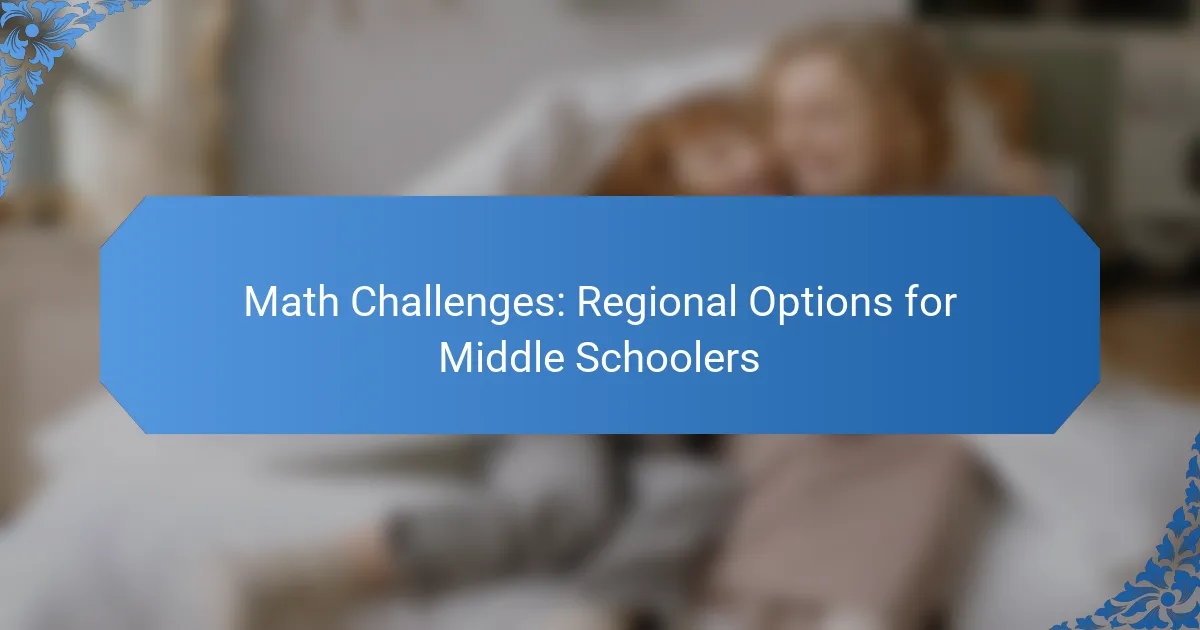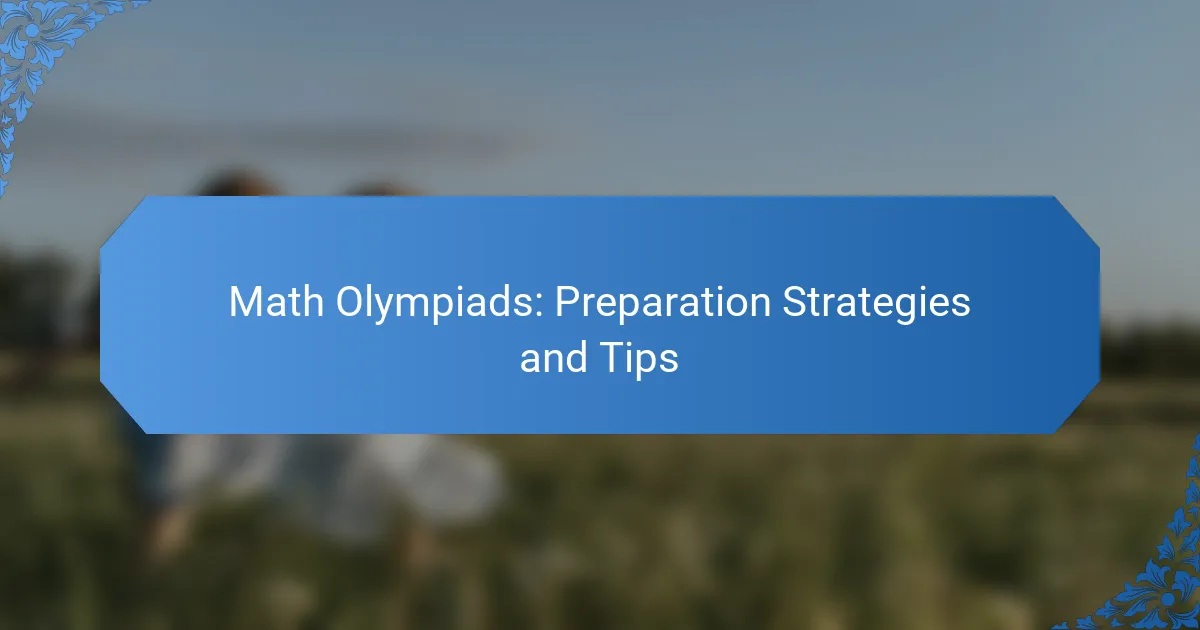Math competitions serve as a platform for young achievers to showcase their talents and determination. Through effective study techniques, mentorship, and a positive mindset, these individuals navigate challenges and achieve remarkable success. Their inspiring stories not only highlight their mathematical prowess but also the personal growth and resilience developed along the way. For more information, check out the benefits of math competitions that are popular among elementary students.
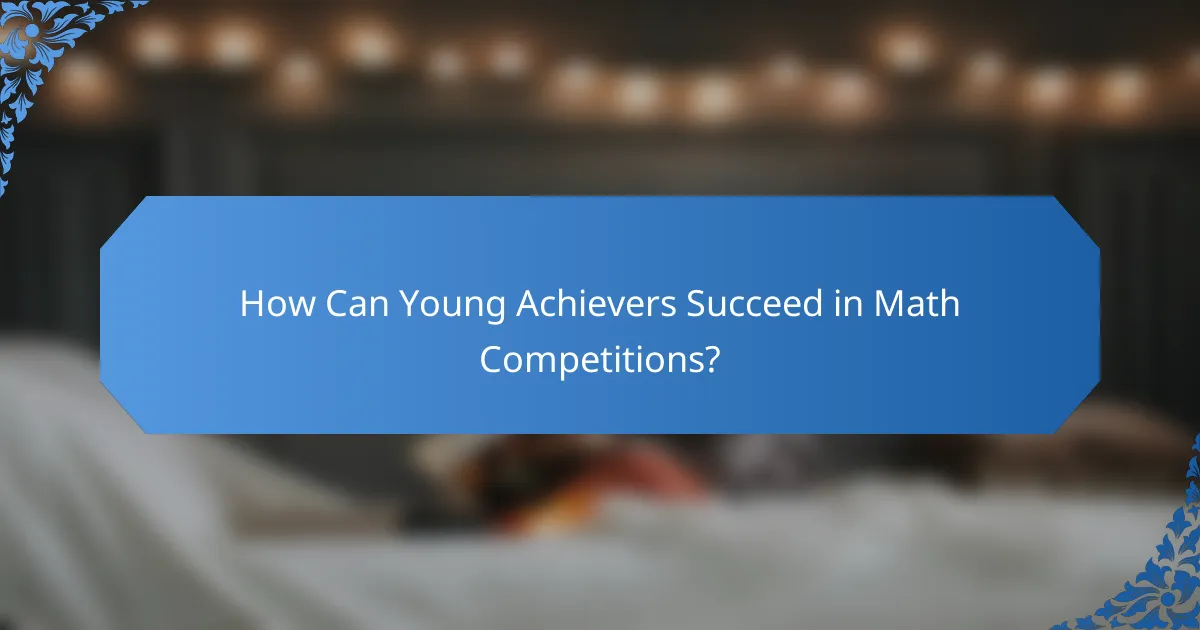
How Can Young Achievers Succeed in Math Competitions?
Young achievers can succeed in math competitions by employing effective study techniques, seeking mentorship, utilizing practice resources, managing their time wisely, and maintaining a positive mindset. These strategies help build the necessary skills and confidence to excel in competitive environments.
Effective study techniques
To succeed in math competitions, young achievers should adopt structured study techniques. This includes breaking down complex topics into manageable sections and using active learning methods such as solving problems and teaching concepts to peers.
Creating a study schedule that allocates specific times for different subjects can enhance focus and retention. Regular review sessions can reinforce knowledge and identify areas needing improvement.
Mentorship programs
Participating in mentorship programs can provide young competitors with invaluable guidance and support. A mentor can offer personalized advice, share experiences, and help navigate the challenges of math competitions.
Finding a mentor through school programs or local math clubs can foster a deeper understanding of competition strategies and problem-solving techniques, significantly boosting a young achiever’s confidence and performance.
Practice resources
Access to quality practice resources is crucial for success in math competitions. Young achievers should utilize a mix of textbooks, online platforms, and past competition papers to familiarize themselves with the types of problems they may encounter.
Websites offering interactive problem-solving exercises and forums for discussion can also enhance learning. Regular practice with timed quizzes can help develop speed and accuracy, essential for competition settings.
Time management strategies
Effective time management is vital during math competitions. Young achievers should practice pacing themselves by allocating specific time limits to each problem based on its difficulty level.
Creating a strategy to tackle easier problems first can build confidence and ensure that time is not wasted on challenging questions. Regular practice under timed conditions can help improve overall efficiency and performance during competitions.
Mindset and motivation
A positive mindset and strong motivation are key factors in achieving success in math competitions. Young achievers should focus on setting realistic goals and celebrating small victories to maintain enthusiasm.
Developing resilience in the face of challenges is essential. Encouragement from peers, family, and mentors can help sustain motivation and foster a competitive yet supportive environment.
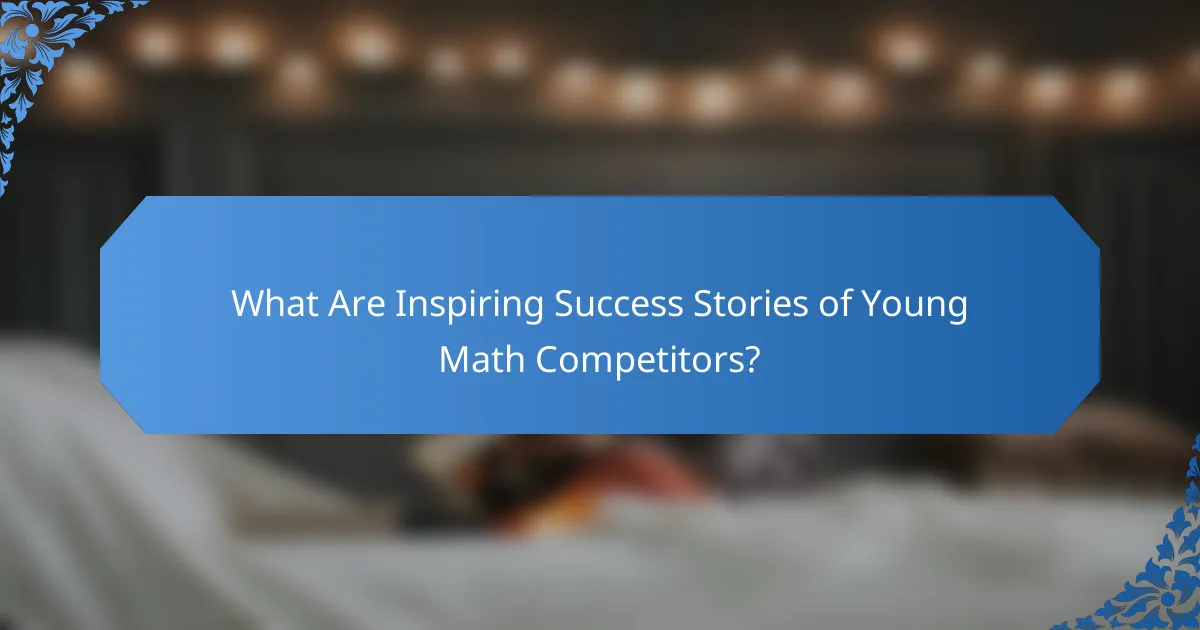
What Are Inspiring Success Stories of Young Math Competitors?
Inspiring success stories of young math competitors highlight the journeys of talented individuals who excel in mathematics through dedication and innovative thinking. These narratives often showcase their challenges, achievements, and the impact of their hard work on their personal and academic lives.
Example: Aimee’s journey to the Math Olympiad
Aimee’s path to the Math Olympiad began at a young age when she discovered her passion for problem-solving. She dedicated countless hours to practice, participating in local math clubs and competitions to hone her skills.
Her commitment paid off when she qualified for the national level, where she faced tough competition. Aimee’s story emphasizes the importance of perseverance and seeking mentorship from experienced mathematicians to navigate complex problems effectively.
Example: Jason’s rise in national competitions
Jason’s rise in national competitions is marked by his strategic approach to preparation. He focused on understanding the fundamentals of mathematics while also exploring advanced topics that often appeared in contests.
By participating in various competitions across the country, he gained valuable experience and confidence. Jason’s success illustrates the significance of consistent practice and learning from both victories and defeats to improve performance over time.
Example: Maria’s innovative problem-solving
Maria stands out for her innovative problem-solving techniques, which she developed through creative thinking and collaboration with peers. She often approached problems from different angles, allowing her to find unique solutions that others might overlook.
Her ability to think outside the box not only helped her excel in competitions but also inspired her classmates to adopt similar strategies. Maria’s journey highlights the value of creativity in mathematics and the benefits of working with others to enhance problem-solving skills.
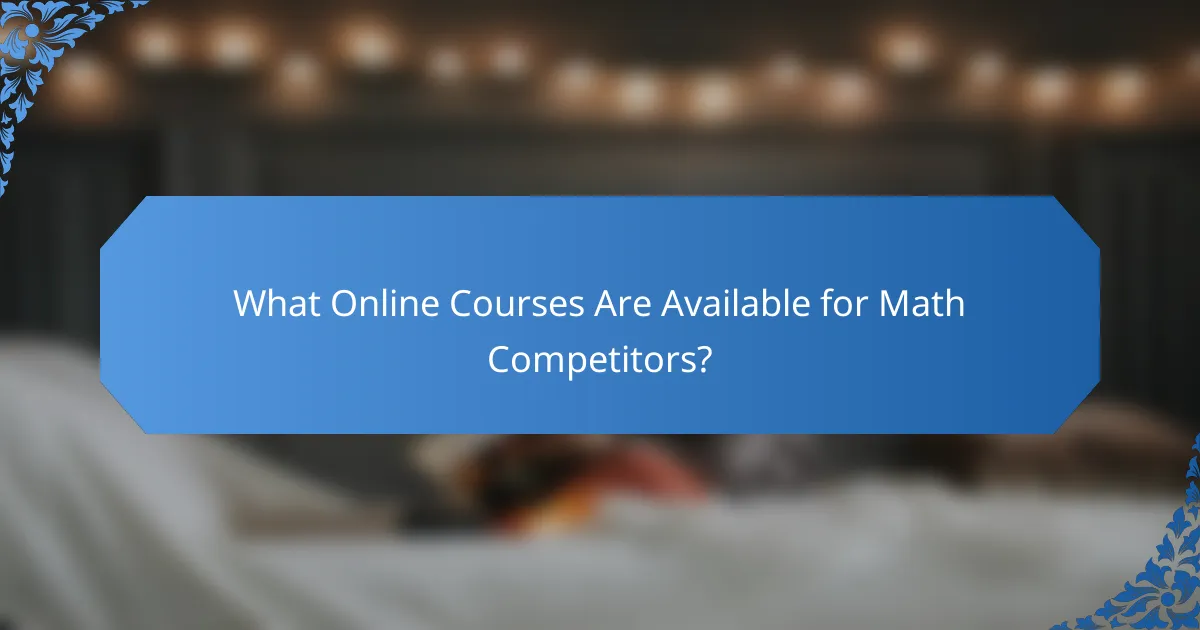
What Online Courses Are Available for Math Competitors?
Math competitors can access a variety of online courses designed to enhance their problem-solving skills and prepare them for competitions. These courses often cover advanced topics and provide practice problems to help students excel in math contests.
Course offerings from Art of Problem Solving
Art of Problem Solving (AoPS) offers a comprehensive range of courses tailored for math enthusiasts and competitors. Their curriculum includes classes on algebra, geometry, number theory, and combinatorics, all aimed at developing critical thinking and problem-solving abilities.
Courses are typically structured with interactive lessons, problem sets, and forums for discussion. AoPS also provides resources like textbooks and online communities to support learners in their preparation for competitions such as the AMC and AIME.
Courses by Brilliant.org
Brilliant.org focuses on engaging users with hands-on learning experiences in mathematics and science. Their courses cover a variety of topics, including logic, probability, and advanced calculus, which are essential for math competitions.
Brilliant’s platform encourages active problem-solving through interactive quizzes and challenges. Users can track their progress and receive immediate feedback, making it a practical choice for those looking to sharpen their skills in a competitive environment.
Online resources from Khan Academy
Khan Academy provides a wealth of free resources for math learners, including instructional videos and practice exercises. Their math section covers everything from basic arithmetic to advanced topics relevant for competition preparation.
While Khan Academy may not offer specialized courses for math competitions, its extensive library allows students to build foundational skills and tackle challenging problems at their own pace. This flexibility is ideal for competitors seeking to strengthen their understanding before major contests.
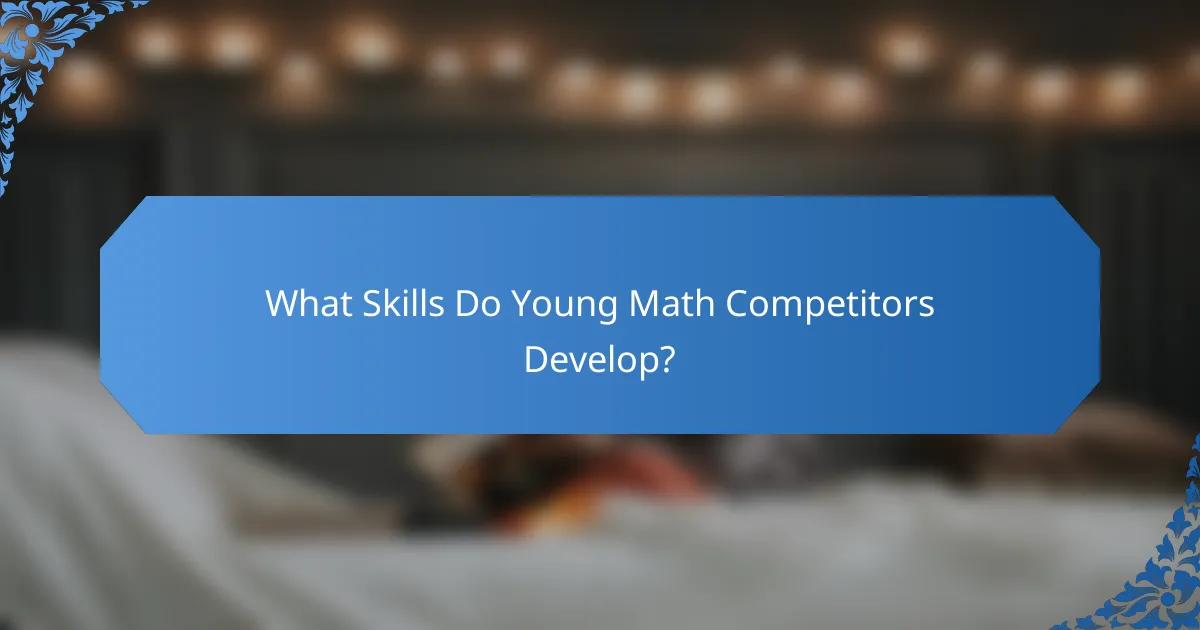
What Skills Do Young Math Competitors Develop?
Young math competitors develop a range of skills that are essential for academic and personal success. These skills include analytical thinking, problem-solving abilities, and collaboration, all of which contribute to their overall growth and confidence in mathematics and beyond.
Analytical thinking
Analytical thinking involves breaking down complex problems into manageable parts and evaluating them systematically. Young competitors learn to assess information critically, which helps them identify patterns and relationships in mathematical concepts.
For example, when tackling a challenging math problem, competitors might analyze the given data, determine what is being asked, and explore various methods to approach the solution. This skill can be applied in various contexts, from academics to everyday decision-making.
Problem-solving skills
Problem-solving skills are at the core of math competitions, where participants face unique challenges that require innovative solutions. Competitors learn to approach problems creatively, often using trial and error to find the best method.
Practicing with a variety of problems helps them develop strategies for different scenarios. For instance, they might use logical reasoning or mathematical formulas to arrive at solutions, enhancing their ability to think on their feet during competitions.
Collaboration and teamwork
Collaboration and teamwork are crucial in math competitions, especially in team events where participants must work together to solve problems. Young competitors learn to communicate effectively, share ideas, and leverage each other’s strengths to achieve common goals.
Engaging in group activities fosters a sense of camaraderie and encourages participants to support one another. This collaborative spirit not only enhances their math skills but also prepares them for future group projects in academic and professional settings.
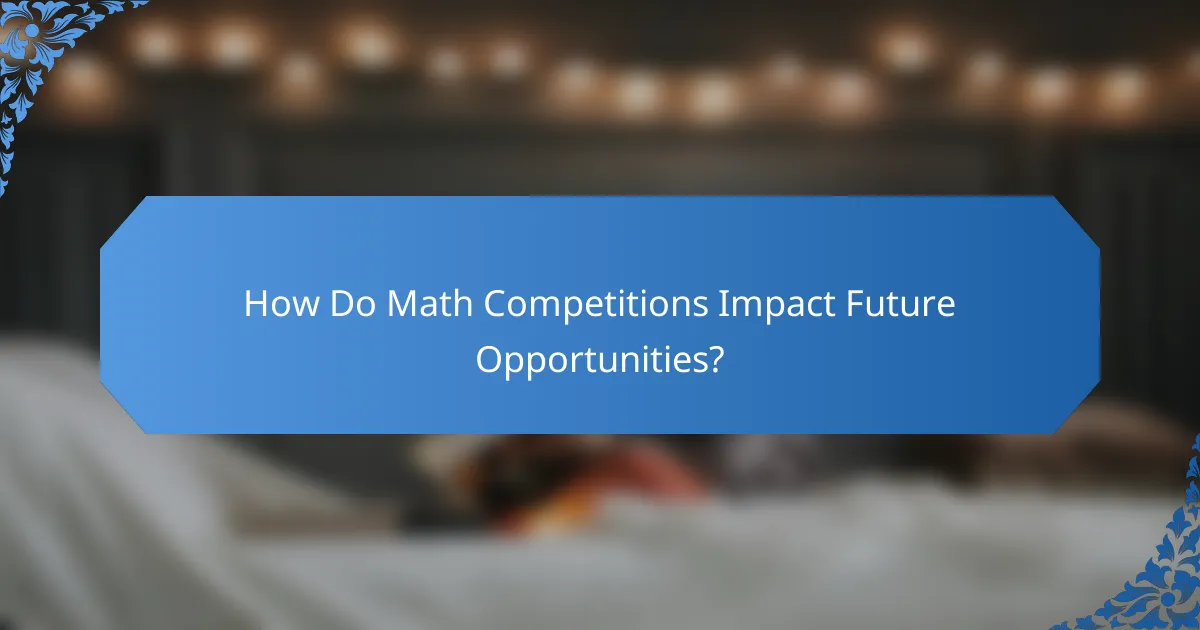
How Do Math Competitions Impact Future Opportunities?
Math competitions can significantly enhance future opportunities for participants by developing critical thinking skills and showcasing talent to colleges and employers. Success in these events often leads to advantages in college admissions and access to various scholarship programs.
College admissions advantages
Participation in math competitions can make a candidate stand out in the college admissions process. Many universities look for students who demonstrate exceptional problem-solving abilities and a passion for mathematics, which competitions highlight.
Top-performing students may receive special consideration or even invitations to exclusive programs. For instance, schools like MIT and Stanford often recognize achievements in math competitions as indicators of a student’s potential for success in rigorous academic environments.
Scholarship opportunities
Numerous scholarships are available specifically for students who excel in math competitions. Organizations and institutions often fund these scholarships to encourage young talent in STEM fields.
For example, the American Mathematics Competitions (AMC) offers scholarships for high scorers, while other local and national contests may provide monetary awards ranging from a few hundred to several thousand dollars. Students should research and apply for these opportunities early to maximize their chances of receiving financial aid.
